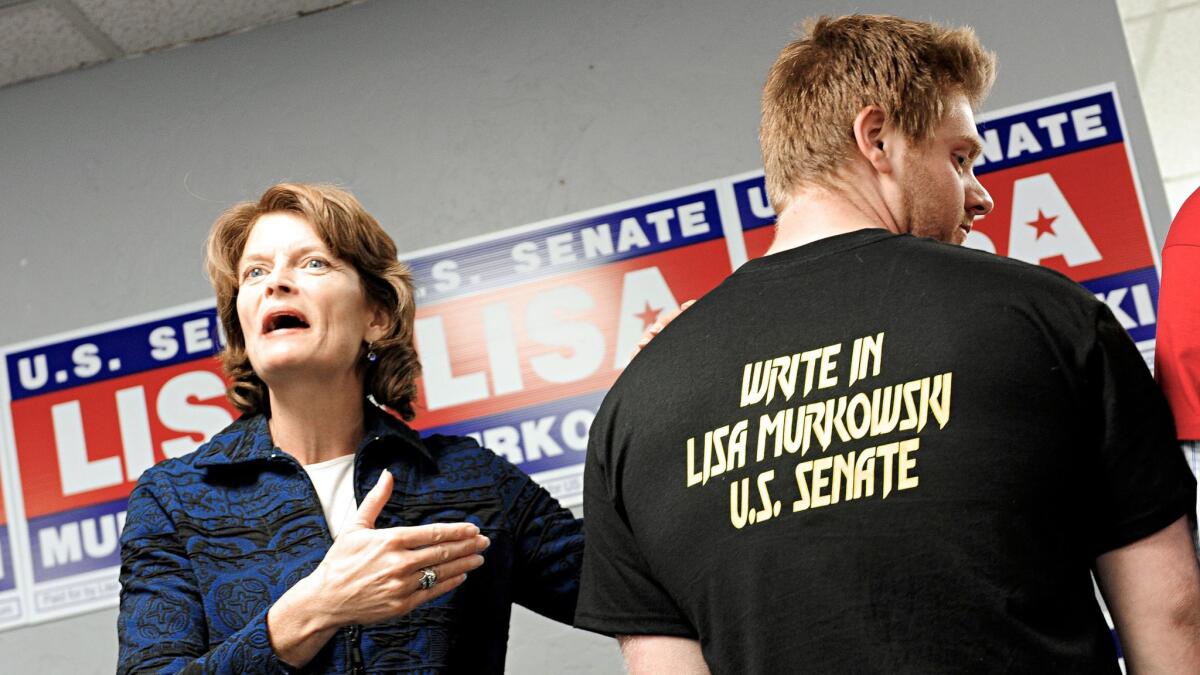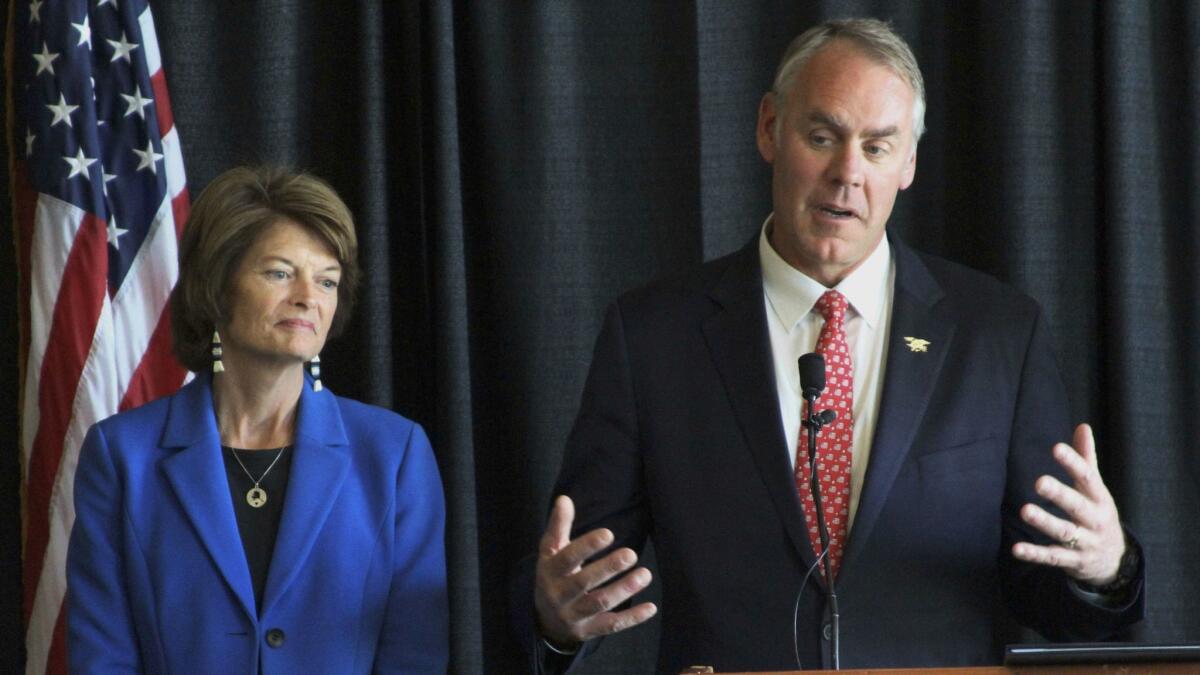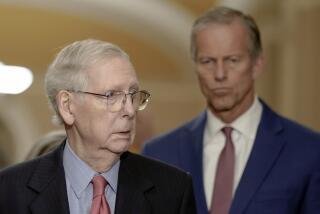Lisa Murkowski walked a tightrope in Alaska when she voted ‘no’ on Obamacare repeal
Before the “no” votes and the Trump tweet and the bare-knuckle threats from her Washington colleagues, there was a time when Sen. Lisa Murkowski struck many Alaskans as overly cautious.
“Her first term [in the U.S. Senate], I think she tended to migrate closer toward the Republican leadership,” said Andrew Halcro, an old friend who served with Murkowski in the Alaska Legislature. “That did frustrate a lot of us more moderate Republicans that were used to seeing her take a more middle ground.”
That was then. After an unlikely path to the Senate and surviving her own party’s attempt to defeat her in a general election, Murkow-ski has grown bolder.
The chairman of the Alaska Republican Party says phones at the state GOP office have been ringing off the hook with Republicans angry or confused by Murkowski’s votes. To some moderates, independents and Democrats, she is a folk hero. Supporters planned a “Stay Strong Lisa” rally on Saturday in Anchorage.
But longtime friends and colleagues say they aren’t surprised by Murkowski’s pivotal role in opposing the GOP push to roll back the Affordable Care Act, known as Obamacare. This new Murkowski making headlines and drawing fire from President Trump? This is the “old Lisa” they knew in Alaska government.
“Lisa is like this element that when she knows she’s doing something right, and political people around her try to pressure her to do the opposite, her resolve gets so much stronger. She just turns into a piece of metal,” Halcro said.
Obamacare vote isn’t the only sign of GOP resistance to Trump »
He met Murkowski in 1998 when the two were campaigning for state House seats in Anchorage. Then — like now — Alaska was grappling with rock-bottom oil prices and facing a budget deficit.
Murkowski, Halcro and other lawmakers worked in a bipartisan Fiscal Policy Caucus that considered reducing the size of the annual Permanent Fund dividend check that every eligible Alaskan receives for living in the oil-rich state, and reinstating an income tax. It was blasphemy to many Alaska Republicans, who considered the dividend checks, in particular, politically untouchable.
Foreshadowing her support of Planned Parenthood in the U.S. Senate, Murkow-ski voted in the state House in 2002 against a proposal to restrict Medicaid-funded abortions considered medically necessary.
“I may have a very short-lived political future here,” Murkowski said on the House floor. “But you know, I’ve got great kids, and a great husband, and I’m going to have a good heart, and I’m going to stand up for the Constitution, and I’m going to stand up for the women of the state of Alaska.”
In 2002, a GOP challenger came within 56 votes of defeating Murkowski in the state primary.
“She had the same kind of problems that she has now,” said Charles Wohlforth, a former Anchorage assemblyman who has praised Murkowski’s healthcare votes as a columnist for Alaska Dispatch News. “She was a moderate and the party was moving to the right.”
In the big state/small town of Alaska politics, Wohlforth attended the same PTA meetings as Murkowski. Her husband, a former chef, catered Wohlforth’s wedding.
Wohlforth remembers thinking Murkowski — a Georgetown graduate and attorney — didn’t strike him as someone who would want to be a politician. Her father, Frank Murkowski, was a 22-year U.S. senator, so name recognition wasn’t a problem. But Lisa Murkowski seemed quiet, even shy, Wohlforth said.
Yet when the elder Murkowski was elected governor of Alaska in 2002 and had to appoint his replacement to represent the state in the U.S. Senate, he turned to his daughter.
Despite complaints of nepotism, in 2004 Lisa Murkowski defeated former Gov. Tony Knowles, a Democrat, to retain the seat for a full six-year term.
As her power and influence with GOP leadership grew, her tendency to be thoughtful and analytical sometimes made her appear “wishy-washy” to liberals and moderates who wanted her to vote independently of her party, Wohlforth said.
Halcro recalls a meeting with Murkowski’s friends and supporters in early 2010 as Murkowski prepared to run for reelection. Friends told Murkowski that they were worried she was “becoming less Lisa and more D.C.,” Halcro said. He remembers her nodding as she listened.
Later that year, tea party challenger Joe Miller shocked Murkowski with a primary election defeat to become the chosen GOP candidate. After being told she wasn’t moderate enough, she had been knocked off the ballot by a far-right conservative.

Murkowski regrouped to run an implausible write-in campaign. In many ways, it was the middle ground that saved her. Even as former Gov. Sarah Palin backed Miller, Murkowski surged to a comeback win with the help of rural Alaska Native voters and Miller’s own campaign missteps.
Her write-in victory was the first for a Senate candidate since 1954.
“That’s when she started to distance herself from leadership,” Halcro said.
Murkowski sailed to reelection in 2016 and does not have to run again until 2022. With that peace of mind, she entered the healthcare debate this year.
In her annual speech to the state Legislature in February, Murkowski said she would vote against legislation to repeal Obamacare if the proposals sought to defund Planned Parenthood or roll back Medicaid expansion, provided the Legislature wanted to keep the expansion.
About 1 in 4 Alaskans is covered by Medicaid, according to a June report prepared for the state health department. Under the House-passed healthcare bill, Alaska was expected to lose $2.8 billion in federal Medicaid funds between 2020 and 2026.
When the Senate on Tuesday advanced the Republican leadership’s plan to repeal and replace Obamacare, Murkowski voted no. Along with Sens. John McCain of Arizona and Susan Collins of Maine, Murkowski also voted against a GOP “skinny repeal” of the Affordable Care Act.
Trump fired off a tweet: “Senator @lisamurkowski of the Great State of Alaska really let the Republicans, and our country, down yesterday. Too bad!”
Murkowski and Sen. Daniel Sullivan (R-Alaska) each received a call from Interior Secretary Ryan Zinke warning that Murkowski’s vote had put Alaska projects and priorities in danger, Alaska Dispatch News reported.
On the same day Zinke reached out to Alaska’s senators, a committee led by Murkowski postponed votes on six Trump administration nominees.
Asked about the potential electoral threat from Trump, Murkowski told NBC on Wednesday that her next election was a long way off. “Every day shouldn’t be about winning elections,” she said. “How about just doing a little governing around here? That’s what I’m here for.”

Alaska state GOP Chairman Tuckerman Babcock said Republicans were “unanimous” in their displeasure with Murkowski’s votes. Repeal of Obamacare was a core GOP agenda item, and Murkowski did not signal that she would break with the party on the issue during her most recent campaign, he said.
“I don’t know what she’s going to do next to repair the relationship with Republican voters in Alaska,” Babcock said.
Murkowski has won without the party’s backing before. As for threats from Trump and Washington colleagues, they were sure to backfire, Murkowski’s supporters said.
“We don’t stand for being bossed by Washington,” Wohlforth said. “That’s part of the whole Alaska ethos. Lisa Murkowski was raised on that.”
Hopkins is a special correspondent.
ALSO
Frustrated in defeat, Trump threatens healthcare of voters -- and lawmakers
GOP confronts an inconvenient truth: Americans want a healthcare safety net
More to Read
Start your day right
Sign up for Essential California for news, features and recommendations from the L.A. Times and beyond in your inbox six days a week.
You may occasionally receive promotional content from the Los Angeles Times.






